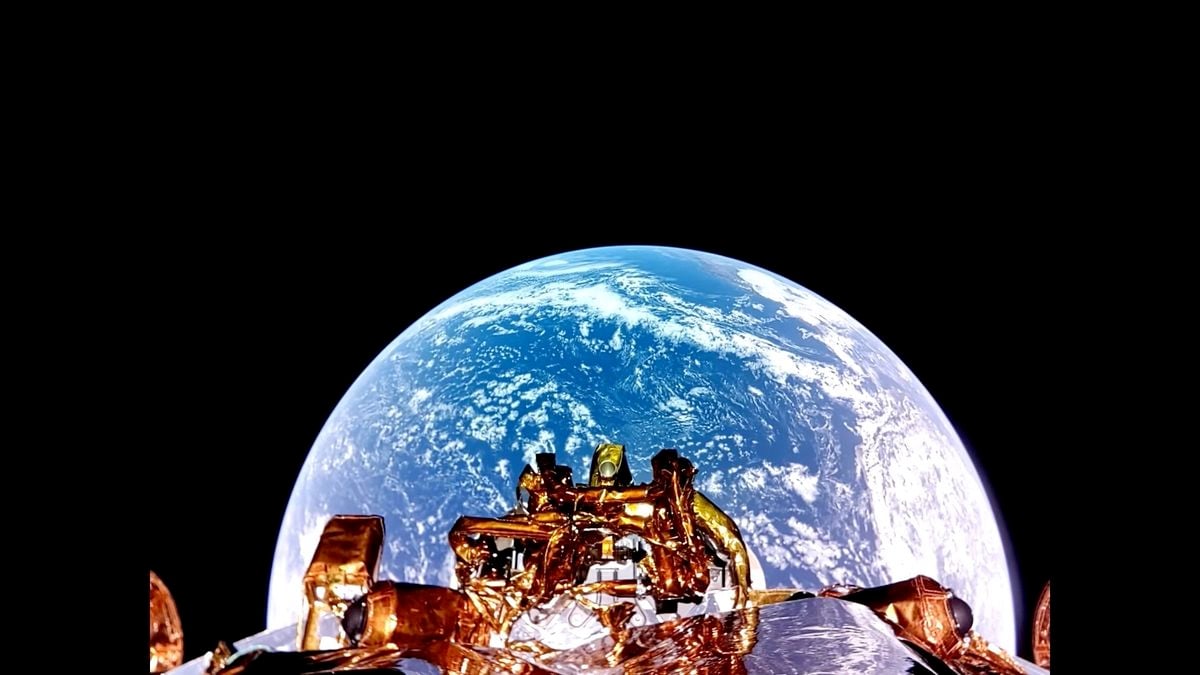
:focal(960x549:961x550)/https://tf-cmsv2-smithsonianmag-media.s3.amazonaws.com/filer_public/9d/56/9d56edeb-5288-4f98-9018-e0f10ffa4d83/54304804759_c0646e16dd_o.jpg)
Blue Ghost captured an Earth “selfie” from its orbit.
Firefly Aerospace
On its way to the moon, Firefly Aerospace’s Blue Ghost lunar lander has taken its first space pictures as it orbits Earth.
The Texas-based company has been sharing the breathtaking videos and images in the weeks since Blue Ghost’s launch on January 15. The lander was part of a shared SpaceX ride that also carried the private lunar lander Resilience, built by Japanese company Ispace. Packed with science payloads for NASA, Blue Ghost is taking a long, “scenic route” to the moon—and the new visuals prove just how stunning of a route it is.
Blue Ghost captured footage of the Earth eclipsing the sun, as well as other dramatic “Blue Marble” views of our planet from space. On January 31, it recorded the Earth eclipsing the moon.
A “Blue Marble” shot of the Earth Firefly Aerospace/https://tf-cmsv2-smithsonianmag-media.s3.amazonaws.com/filer_public/26/70/267046f6-44d6-4c29-a947-0f0ab34c1742/54283932532_582fd42073_o.jpg)
The lander is currently in a 25-day Earth orbit. In about four days, Blue Ghost will perform an engine burn that will propel it out of Earth’s vicinity and start the next phase of its journey to the moon. Until then, “we’re going to do a bunch of payload operations, continue with system checkouts, just make sure everything is precisely tuned,” says Will Coogan, Firefly’s Blue Ghost chief engineer, in a video update about the mission.
As Blue Ghost progresses, “we expect to capture even more breathtaking imagery,” Coogan writes in an email to CNN’s Taylor Nicioli. “Most importantly, we’ll be capturing critical science data for our NASA customers all along the way that will pave the way for a lasting lunar presence and unlock exploration further into our solar system.”
Firefly also shared the lander’s first two images of the moon. One of them shows the moon from a distance—a tiny white speck in a sea of black—and the other captures the lander’s hardware with a view of the moon in the background.
“Firefly’s first moon and Blue Marble images captured by our Blue Ghost lunar lander embodies everything this bold, unstoppable team has worked so hard for over the last three years. And we’re just getting started,” Coogan adds to CNN.
Blue Ghost’s first image of the moon Firefly Aerospace/https://tf-cmsv2-smithsonianmag-media.s3.amazonaws.com/filer_public/5c/92/5c92cf7f-b251-4423-8146-a39254fbd359/54291546184_2dc128f19c_k.jpg)
The moon, as seen from the top deck of the Blue Ghost lunar lander Firefly Aerospace/https://tf-cmsv2-smithsonianmag-media.s3.amazonaws.com/filer_public/8c/58/8c5869a1-2d67-4763-a3ae-f42a2b2d879b/54291306866_07c0e65b0b_k.jpg)
The company also plans to capture a phenomenon called the lunar horizon glow in high definition, reports CNN. Spotted on NASA’s Apollo missions and by some robotic spacecraft, this bright, crescent-shaped haze over the lunar surface is thought to be caused by floating dust.
After the engine burn, Blue Ghost will orbit the moon for 16 days before starting its descent to Mare Crisium, a basaltic plain on the moon’s near side. There, it’ll perform scientific tests and collect samples for around two weeks as part of NASA’s Commercial Lunar Payload Services initiative. Six NASA payloads are on the flight, per the agency, and all are healthy.
Ispace’s Resilience lander that started its journey with Blue Ghost still has a few months to go before it reaches the moon, and the company reports that it’s on schedule.








